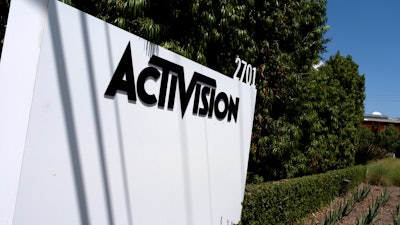
SAN FRANCISCO (AP) — Microsoft on Thursday will try to gain clearance to complete a $69 billion takeover of video game maker Activision Blizzard in a legal showdown with U.S. regulators that will reshape a pastime that's bigger than the movie and music industries combined.
The battle will pit Microsoft's ambition to expand its video game imprint beyond its Xbox console against the U.S. Federal Trade Commission's bid to block a deal that it contends will stifle competition and innovation to the detriment of consumers.
It's the latest twist in a deal that was announced 17 months ago. Both Microsoft CEO Satya Nadella and Activision Blizzard CEO Bobby Kotick are expected to testify at some point during five days of hearings in San Francisco before U.S. District Judge Jacqueline Scott Corley that will conclude June 29.
FTC lawyers will call upon experts and a top executive for Sony, the maker of the industry-leading PlayStation video game console, to show why Microsoft will gain an unfair advantage if it is allowed to blend its Xbox franchise with an Activision acquisition that will give it ownership of popular video game titles such as Call of Duty, World of Warcraft and Candy Crush.
After all the evidence and arguments are presented, Corley will decide whether or not to grant the FTC's request for a court order that would keep the deal in a holding pattern until a more exhaustive administrative trial that's scheduled to begin in Washington D.C. on August 2. The judge isn't expected to rule until after the Fourth of July holiday.
If Corley declines to issue an injunction, Microsoft could move to close the deal ahead of a July 18 deadline and avert a $3 billion breakup fee.
The wrangling over the deal has cast a spotlight on the growing importance of video gaming, a pursuit that has already garnered an estimated of audience of about 3 billion people worldwide who play at least some of the time on a console, personal computer or, increasingly, smartphone. The market is expected to swell to 4.5 billion people by 2030.
All those gamers are willing to pay upwards of $70 to own marquee titles like Call of Duty or fork over a steady stream of recurring subscriptions to services such as Microsoft's Xbox Game Pass, Amazon's Luna and Nvida's GeForce.
Microsoft is framing the proposed Activision deal as a way to make inroads against Sony's PlayStation, which has a far larger market share, while providing new benefits for video game players. Among other things, Microsoft cites a 10-year commitment to make Call of Duty available on Nintendo's Switch console and a willingness to make a similar decade-long deal with PlayStation, and also argues video gamers will gain more access to even more games on its Xbox subscription service.
The FTC has countered the deal will give too much power to Microsoft, already one of the world's richest companies because of a personal computer software empire that the U.S. Justice Department tried to break up in landmark antitrust case more than 20 years ago. Regulators also allege Microsoft can't be trusted not to gradually make the most popular video games exclusive to its own Xbox console and subscription services, based on its handling of titles after buying video game maker ZeniMax Media in 2021.
The hearings will also be another test of the FTC's amped-up oversight of Big Tech under Chairperson Lina Khan, who has been outspoken about her belief that U.S. regulators were too lenient in past deals that helped increase the power of companies such as Amazon, Google and Facebook. The courtroom tussle with Microsoft comes six months after the FTC took Facebook owner Meta Platforms to court in Silicon Valley to try to stop a takeover of a virtual reality fitness company only to be rebuffed by the judge in that case.
The FTC could face challenges convincing Corley to block the Activision deal. The judge previously showed skepticism about the need to prevent the takeover in March when she dismissed a lawsuit brought by a group of gamers who sued to stop the acquisition.
Like regulators are now, the gamers argued that Microsoft’s takeover of Activision would stifle competition and reduce consumer choice. They later brought an amended lawsuit, but Corley in May denied their request for an injunction to block the deal.
Another major regulator, the U.K.’s Competition and Markets Authority, also has taken action to thwart Microsoft's takeover.
But European regulators representing the 27-nation bloc approved the deal last month on condition that Microsoft make some promises meant to boost competition in the cloud-based gaming market. A number of other countries, including China, Japan, Brazil and South Korea, have also approved it.
Microsoft has lashed back against the British regulators standing in its way with an appeal of their decision, as well as voicing strong opposition to U.K. government officials.
—-
AP Technology Writer Matt O'Brien contributed to this story.






















